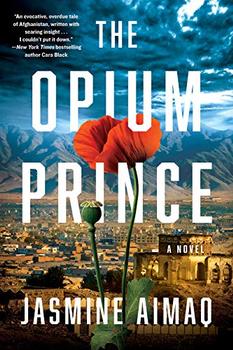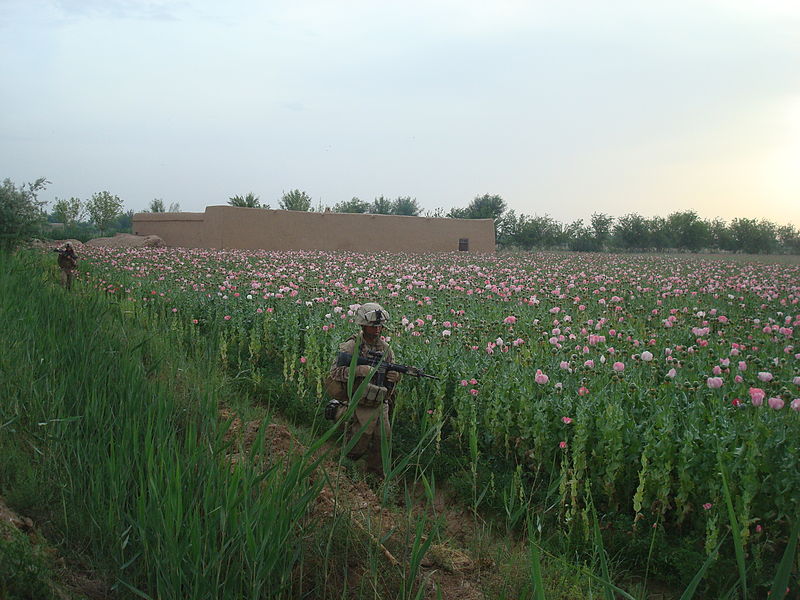Summary | Excerpt | Reviews | Beyond the Book | Read-Alikes | Genres & Themes | Author Bio

This article relates to The Opium Prince
The events of Jasmine Aimaq's debut novel, The Opium Prince, play out in the lead-up to the 1978 Saur Revolution, in which the Afghan president Mohammed Daud Khan was assassinated and overthrown by the Soviet-backed Marxist People's Democratic Party of Afghanistan (the PDPA). The president had himself come to power in 1973 by overthrowing the monarch Mohammed Zahir Shah with the backing of the PDPA but had eventually grown wary of the party's Soviet influence.
Between these two revolutionary events, Aimaq's protagonist, Daniel Sajadi, is in Afghanistan as the director of an American agency that aims to fight the cultivation of opium by encouraging and aiding the cultivation of food crops. While the agency, USADE, is fictional, its mandate and the United States government's focus on eradicating opium are consistent with the messy history of American foreign policy and intervention in Afghanistan. US counter-narcotic efforts in Afghanistan are now often viewed as a failed venture. This perspective was summarized in 2009 by the US Special Representative for Afghanistan and Pakistan, Richard Holbrooke, when he referred to US attempts to combat opium production in the country as "the most wasteful and ineffective program I have seen in 40 years in and out of government."

Opium has long been a source of global conflict. The Opium Wars of the mid-19th century pitted China against both Britain and France, and cultivation of opium in British India served to globalize the trade of, and in turn increase demand for, the highly addictive substance. Today, opium is used for legal medicinal purposes, but illicit heroin production as well as the illegal use and distribution of prescription opioids also drives its continued demand and complicates its regulation.
While opium has been cultivated in Afghanistan for at least the past century, its production there increased in the 1970s and into the '80s as a result of a lack of government regulation as well as the loss of other types of agriculture due to political instability and conflict. In the late '70s, the Cold War spurred US intervention in the country to support Muslim guerrillas, who were working to combat the Soviet Red Army. As is shown in Aimaq's novel, there were US counter-narcotics efforts taking place in Afghanistan at this time, but the American presence there actually aided the opium trade, as the guerrillas relied on opium to fund their resistance.
Throughout the '80s, Afghanistan continued to serve as a proxy stage for the Cold War, but in the early '90s, the withdrawal of American and Soviet troops left a power vacuum that allowed for the rise of the fundamentalist Taliban regime, which took control of the country in 1996. The Taliban initially encouraged the growing of poppies for the production of opium, even going so far as to offer government protection for opium exports. Following a period of drought that caused a food shortage in 2000, however, they prohibited opium cultivation in an apparent effort to garner international support and aid. This move was praised by the US even as the UN imposed sanctions on the country due to the Taliban's protection of Osama Bin Laden. The following year, the US invaded Afghanistan after the September 11, 2001 attacks on the World Trade Center.
In 2004, fearing that illicit opium trade was supporting a revitalization of the Taliban, US President George W. Bush and Secretary of State Colin Powell pushed for strong counter-narcotic efforts that were opposed by the American ambassador to Afghanistan, Zalmay Khalilzad, and the Afghani finance minister (future Afghan president), Ashraf Ghani, who stated that these efforts would eliminate livelihoods and increase poverty in the country. Despite subsequent US attempts to eliminate opium through private contractors, Afghanistan continued to recognize record harvests, and in 2007 was supplying an estimated 93 percent of the world's opium.
During its first term in 2009, the Obama administration continued spending on efforts to counter the Taliban in Afghanistan, including a surge of troops in the area. However, attempts to eradicate poppy cultivation were halted as Holbrooke took office with the administration, and the US focus shifted to attempting to provide alternative livelihoods for poppy farmers. Nevertheless, efforts to cultivate alternative crops failed, as the irrigation canals funded by the American government also provided hydration for the far more profitable poppy crops.
In 2017, the Trump administration launched Operation Iron Tempest, which included around 200 airstrikes by the US military on suspected opium labs in Afghanistan. Not all of these structures were in fact opium labs; some were just empty mud compounds. This operation is just one example of how American counter-narcotic campaigns in Afghanistan have continued to largely be ineffective and have also contributed to ongoing instability in the country.
United States Marines on patrol through a poppy field in Marjah, Afghanistan in 2010, by Puckett88 (CC BY-SA 3.0)
Filed under Society and Politics
![]() This "beyond the book article" relates to The Opium Prince. It originally ran in February 2021 and has been updated for the
January 2022 paperback edition.
Go to magazine.
This "beyond the book article" relates to The Opium Prince. It originally ran in February 2021 and has been updated for the
January 2022 paperback edition.
Go to magazine.
Your guide toexceptional books
BookBrowse seeks out and recommends the best in contemporary fiction and nonfiction—books that not only engage and entertain but also deepen our understanding of ourselves and the world around us.